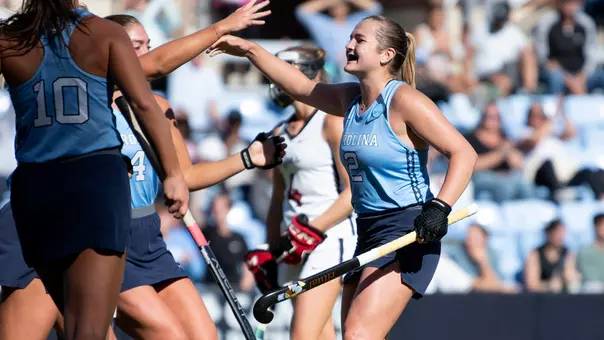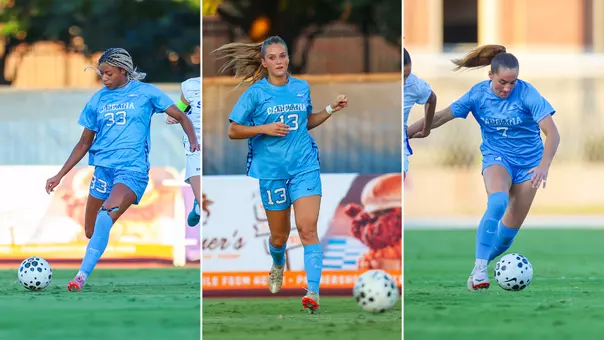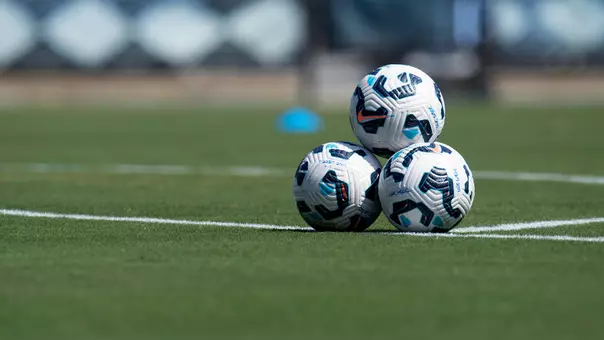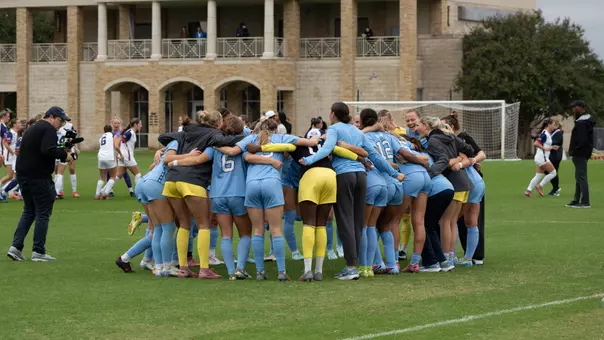University of North Carolina Athletics

Photo by: UNC Athletic Communications
GoHeels Exclusive: A Championship Legacy In Women's Athletics
March 31, 2020 | Field Hockey, Women's Lacrosse, Women's Soccer, Women's Tennis, Featured Writers
By Pat James, GoHeels.com
Before she joined the Virginia women's lacrosse team, back in the fall of 1988, Jenny Levy had never really met anyone like herself.
Growing up in Baltimore, Levy had immersed herself in sports. And although many other girls her age had, as well, none matched her intensity, her passion or her competitive spirit, she said. Few came close even in her time with the Cavaliers.
Upon becoming North Carolina's women's lacrosse coach in 1994, Levy said many of her players also hadn't grown up around girls who shared their interests. Over time, though, as it's become more common and accepted for women to be as ambitious as Levy, both in and outside athletics, she hasn't heard her players make such comments.
Still, at UNC, they find themselves in an environment unlike any other.
"When you come into Carolina as a female athlete, whether it's as a lacrosse player, soccer player, field hockey player or tennis player," Levy said, "you're coming into an environment where there are a lot of women, more than you've ever experienced before, who all have similar fabric in personality. … Carolina creates that because we all attract a certain type of student-athlete, female-wise."
Many of whom have become champions.
Of UNC's 52 team national championships, 37 have been captured by the women's programs. Female student-athletes have also won 31 of the Tar Heels' 57 individual national titles. Ask any of the head coaches of those programs what it takes to build such a tradition and they'll say hardworking student-athletes with great character. But there are certainly other factors, too.
Perhaps chief among them is the support all the women's programs have received over the years. That, Anson Dorrance said, has not only come from every chancellor, athletic director and administrator, but also the likes of Dean Smith, Roy Williams and Mack Brown, among others.
"The way women's athletics thrives doesn't come through a selfish culture because if you look at selfish cultures, they're only interested in themselves," said Dorrance, the 43-year head coach of the women's soccer program. "So, you can go to programs where the only two thriving institutions within the athletic departments are their football teams and men's basketball teams. But because of these remarkable leaders through the years … the DNA in that water is we're going to treat everyone extraordinarily well.
"The first group to benefit from this kind of noblesse oblige are women's athletics because usually we're the last rung on the ladder. And that's not the attitude at North Carolina."
Those leaders aren't the only ones who have contributed to Carolina's championship culture. The head coaches have, too. None, however, have been as successful as Dorrance, the winner of 22 national championships. His teams have also captured 22 ACC Tournament titles and 23 ACC regular-season championships.
"We've had some other strong programs, as well, but Anson took it to another level." said Karen Shelton, who became the head coach of the field hockey team in 1981, two years after Dorrance founded the women's soccer program and the same year he won his first national title (AIAW).
"His program, I think, has been a model – not that we're all following his lead, because obviously he has his style and his way. But he did set the bar and set a standard. We've been known for our strength in women's athletics, and I think that success has helped perpetuate more success. You've got to look to them first."
But Shelton's program is a close second.
In her 39 years in Chapel Hill, Shelton has led the Tar Heels to eight NCAA championships, 22 ACC Tournament titles and 37 winning seasons – highlighted by back-to-back undefeated campaigns in 2018 and 2019. Dorrance is the only head coach in ACC history with more national titles. His program is also the only current member of the ACC with more.
When she became UNC's first women's lacrosse coach, Levy believed wholeheartedly that her program would flourish, given the University's academic reputation. She knew the success of the other programs, such as Dorrance's and Shelton's, would also attract recruits.
Dorrance and Shelton both proved instrumental in helping Levy get her program off the ground. Their players, as well as some from other women's programs, hosted future members of the women's lacrosse team on their on-campus visits. Levy also benefitted from having two women's soccer players (Sarah Dacey and Aubrey Falk) and a field hockey player (Sharon Moore) on her early teams, which helped instill a championship mindset.
There were also numerous lessons learned just from observing Dorrance and Shelton.
"There was no ambiguity in what their expectations were, what their standards were, for their athletes," said Levy, who has led her program to two NCAA championships and five ACC Tournament titles. "That was really clear to me. Each team had a different culture as I followed along and got to know their athletes and got to know them personally, both Anson and Karen. And they both have extremely different styles of management and leadership.
"Obviously, both are really successful. So, it told me right away that there's no one way, but you've got to be really clear on your values and your standards and your expectations."
Levy isn't the only Carolina coach who has embraced that approach.
The women's soccer team's core values are as much a part of the program's mystique as its dominance. Each core value has a corresponding statement from Dorrance that describes it. Some statements feature a passage from a philosopher, author or poet, while others include a note from a former player.
Partially inspired by that, Brian Kalbas, the head coach of the women's tennis team since 2003, created a "TAR HEELS" value system this season. According to Kalbas, the "T" is for toughness, the "A" is for attitude, the "R" is for relationships, the "H" is for hard work, the "Es" are for excellence and enthusiasm, the "L" is for learning, and the "S" is for service.
All of those values have been a part of Kalbas' program for some time. But writing them down, he said, helps further establish them.
"I think it's important to kind of separate us from our competitors and for our players to understand that, to me, the things that are important to me are what's important to our players," said Kalbas, who has led Carolina to four ITA National Team Indoor Championships. "Hey, have a great attitude. Work hard. Have fun. We're a family. Relationships are important.
"I'm very happy and proud of the fact that we've never had a player transfer, and I think everybody's graduated. Not only were we undefeated this year and No. 1 in the nation and we did win the national title, but we had the highest GPA of any sport in the fall. I'm proud of that. We excel in all areas because of the character of the players that we have on our team."
And surrounded by other women like them and people who want to see them succeed, they continue to add to the women's programs' championship legacy.
"I think that we've had a tradition here and a family feeling, I think, more so here than at other places, even though it's been thrown about now far more than ever before," Shelton said. "But I think we've had that for a long time. Kids come here and they expect to compete for championships. And we do."
Before she joined the Virginia women's lacrosse team, back in the fall of 1988, Jenny Levy had never really met anyone like herself.
Growing up in Baltimore, Levy had immersed herself in sports. And although many other girls her age had, as well, none matched her intensity, her passion or her competitive spirit, she said. Few came close even in her time with the Cavaliers.
Upon becoming North Carolina's women's lacrosse coach in 1994, Levy said many of her players also hadn't grown up around girls who shared their interests. Over time, though, as it's become more common and accepted for women to be as ambitious as Levy, both in and outside athletics, she hasn't heard her players make such comments.
Still, at UNC, they find themselves in an environment unlike any other.
"When you come into Carolina as a female athlete, whether it's as a lacrosse player, soccer player, field hockey player or tennis player," Levy said, "you're coming into an environment where there are a lot of women, more than you've ever experienced before, who all have similar fabric in personality. … Carolina creates that because we all attract a certain type of student-athlete, female-wise."
Many of whom have become champions.
Of UNC's 52 team national championships, 37 have been captured by the women's programs. Female student-athletes have also won 31 of the Tar Heels' 57 individual national titles. Ask any of the head coaches of those programs what it takes to build such a tradition and they'll say hardworking student-athletes with great character. But there are certainly other factors, too.
Perhaps chief among them is the support all the women's programs have received over the years. That, Anson Dorrance said, has not only come from every chancellor, athletic director and administrator, but also the likes of Dean Smith, Roy Williams and Mack Brown, among others.
"The way women's athletics thrives doesn't come through a selfish culture because if you look at selfish cultures, they're only interested in themselves," said Dorrance, the 43-year head coach of the women's soccer program. "So, you can go to programs where the only two thriving institutions within the athletic departments are their football teams and men's basketball teams. But because of these remarkable leaders through the years … the DNA in that water is we're going to treat everyone extraordinarily well.
"The first group to benefit from this kind of noblesse oblige are women's athletics because usually we're the last rung on the ladder. And that's not the attitude at North Carolina."
Those leaders aren't the only ones who have contributed to Carolina's championship culture. The head coaches have, too. None, however, have been as successful as Dorrance, the winner of 22 national championships. His teams have also captured 22 ACC Tournament titles and 23 ACC regular-season championships.
"We've had some other strong programs, as well, but Anson took it to another level." said Karen Shelton, who became the head coach of the field hockey team in 1981, two years after Dorrance founded the women's soccer program and the same year he won his first national title (AIAW).
"His program, I think, has been a model – not that we're all following his lead, because obviously he has his style and his way. But he did set the bar and set a standard. We've been known for our strength in women's athletics, and I think that success has helped perpetuate more success. You've got to look to them first."
But Shelton's program is a close second.
In her 39 years in Chapel Hill, Shelton has led the Tar Heels to eight NCAA championships, 22 ACC Tournament titles and 37 winning seasons – highlighted by back-to-back undefeated campaigns in 2018 and 2019. Dorrance is the only head coach in ACC history with more national titles. His program is also the only current member of the ACC with more.
When she became UNC's first women's lacrosse coach, Levy believed wholeheartedly that her program would flourish, given the University's academic reputation. She knew the success of the other programs, such as Dorrance's and Shelton's, would also attract recruits.
Dorrance and Shelton both proved instrumental in helping Levy get her program off the ground. Their players, as well as some from other women's programs, hosted future members of the women's lacrosse team on their on-campus visits. Levy also benefitted from having two women's soccer players (Sarah Dacey and Aubrey Falk) and a field hockey player (Sharon Moore) on her early teams, which helped instill a championship mindset.
There were also numerous lessons learned just from observing Dorrance and Shelton.
"There was no ambiguity in what their expectations were, what their standards were, for their athletes," said Levy, who has led her program to two NCAA championships and five ACC Tournament titles. "That was really clear to me. Each team had a different culture as I followed along and got to know their athletes and got to know them personally, both Anson and Karen. And they both have extremely different styles of management and leadership.
"Obviously, both are really successful. So, it told me right away that there's no one way, but you've got to be really clear on your values and your standards and your expectations."
Levy isn't the only Carolina coach who has embraced that approach.
The women's soccer team's core values are as much a part of the program's mystique as its dominance. Each core value has a corresponding statement from Dorrance that describes it. Some statements feature a passage from a philosopher, author or poet, while others include a note from a former player.
Partially inspired by that, Brian Kalbas, the head coach of the women's tennis team since 2003, created a "TAR HEELS" value system this season. According to Kalbas, the "T" is for toughness, the "A" is for attitude, the "R" is for relationships, the "H" is for hard work, the "Es" are for excellence and enthusiasm, the "L" is for learning, and the "S" is for service.
All of those values have been a part of Kalbas' program for some time. But writing them down, he said, helps further establish them.
"I think it's important to kind of separate us from our competitors and for our players to understand that, to me, the things that are important to me are what's important to our players," said Kalbas, who has led Carolina to four ITA National Team Indoor Championships. "Hey, have a great attitude. Work hard. Have fun. We're a family. Relationships are important.
"I'm very happy and proud of the fact that we've never had a player transfer, and I think everybody's graduated. Not only were we undefeated this year and No. 1 in the nation and we did win the national title, but we had the highest GPA of any sport in the fall. I'm proud of that. We excel in all areas because of the character of the players that we have on our team."
And surrounded by other women like them and people who want to see them succeed, they continue to add to the women's programs' championship legacy.
"I think that we've had a tradition here and a family feeling, I think, more so here than at other places, even though it's been thrown about now far more than ever before," Shelton said. "But I think we've had that for a long time. Kids come here and they expect to compete for championships. And we do."
UNC Volleyball: Tar Heels Best UTEP in NCAA First Round
Friday, December 05
FB: #TheCall26 Signing Day Press Conference
Thursday, December 04
UNC Men's Basketball: Dixon's Clutch Play Leads Tar Heels Past Kentucky, 67-64
Wednesday, December 03
WBB: Courtney Banghart Pre-Texas Media Availability
Tuesday, December 02




